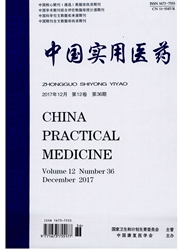

 中文摘要:
中文摘要:
目的观察益气活血中药早期干预对冠心病陈旧心肌梗死(心梗)或支架术后患者心功能及神经内分泌指标的影响。方法 60例冠心病陈旧心梗或支架术后、中医辨证属气虚血瘀型患者,随机分为治疗组与对照组,各30例。对照组采用西药常规治疗,治疗组在西药常规治疗基础上加益气活血中药治疗,连续应用8周。于治疗前后观察两组中医症候积分、生活质量评分、血浆肾素、血管紧张素Ⅱ、醛固酮变化情况。结果治疗组治疗后各指标较治疗前均明显改善(P〈0.05)。治疗后两组中医症候积分、生活质量评分及血浆肾素、醛固酮比较,差异有统计学意义(P〈0.05);治疗后血管紧张素Ⅱ治疗组为(82.1±34.17)ng/(ml·h)与对照组的(93.53±39.40)ng/(ml·h)比较差异无统计学意义(P〉0.05)。结论益气活血法早期干预对陈旧心梗或支架术后患者改善症状及改善神经内分泌调节具有确切疗效。
 英文摘要:
英文摘要:
Objective To observe influence by tonifying Qi and activating blood early intervention on cardiac function and neuroendocrine in patients with coronary heart disease old myocardial infarction or after stenting. Methods A total of 60 patients with coronary heart disease old myocardial infarction or after stenting with Qi deficiency and blood stasis type as syndrome differentiation were randomly divided into treatment group and control group, with 30 cases in each group. The control group received conventional Western medicine for treatment, and the treatment group received additional tonifying Qi and activating blood traditional Chinese medication therapy. Treatment lasted for 8 weeks. Observation was made on changes of traditional Chinese medicine syndrome scores, quality of life scores, plasma rennin, angiotensin Ⅱ, and aldosterone before and after treatment in both groups. Results The treatment group had all better indexes after treatment than those before treatment(P〈0.05). After treatment, the difference of traditional Chinese medicine syndrome scores, quality of life scores, plasma rennin, and aldosterone between the two groups had statistical significance(P〈0.05). There was no statistically significant difference of angiotensin Ⅱ between the treatment group as(82.1±34.17) ng/(ml·h) and the control group as(93.53±39.40) ng/(ml·h)(P〉0.05). Conclusion Tonifying Qi and activating blood early intervention contains precisely curative effect in improving symptom and neuroendocrine regulation in patients with coronary heart disease old myocardial infarction or after stenting.
 同期刊论文项目
同期刊论文项目
 同项目期刊论文
同项目期刊论文
 期刊信息
期刊信息
